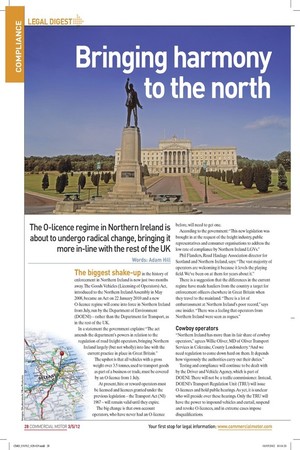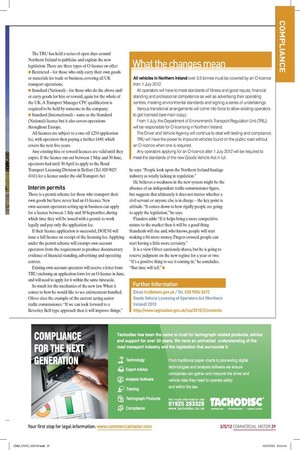Bringing harmony to the north
Page 21

Page 22

If you've noticed an error in this article please click here to report it so we can fix it.
The O-licence regime in Northern Ireland is about to undergo radical change, bringing it more in-line with the rest of the UK
Words: Adam Hill
The biggest shake-up in the history of enforcement in Northern Ireland is now just two months away. The Goods Vehicles (Licensing of Operators) Act, introduced to the Northern Ireland Assembly in May 2008, became an Act on 22 January 2010 and a new O-licence regime will come into force in Northern Ireland from July, run by the Department of Environment (DOENI) – rather than the Department for Transport, as in the rest of the UK.
In a statement the government explains: “The act amends the department’s powers in relation to the regulation of road freight operators, bringing Northern Ireland largely (but not wholly) into line with the current practice in place in Great Britain.” The upshot is that all vehicles with a gross weight over 3.5 tonnes, used to transport goods as part of a business or trade, must be covered by an O-licence from 1 July.
At present, hire or reward operators must be licensed and licences granted under the previous legislation – the Transport Act (NI) 1967 – will remain valid until they expire.
The big change is that own-account operators, who have never had an O-licence before, will need to get one.
According to the government: “This new legislation was brought in at the request of the freight industry, public representatives and consumer organisations to address the low rate of compliance by Northern Ireland LGVs.” Phil Flanders, Road Haulage Association director for Scotland and Northern Ireland, says: “The vast majority of operators are welcoming it because it levels the playing field. We’ve been on at them for years about it.” There is a suggestion that the differences in the current regime have made hauliers from the country a target for enforcement officers elsewhere in Great Britain when they travel to the mainland. “There is a lot of embarrassment at Northern Ireland’s poor record,” says one insider. “There was a feeling that operators from Northern Ireland were seen as rogues.”
Cowboy operators
“Northern Ireland has more than its fair share of cowboy operators,” agrees Willie Oliver, MD of Oliver Transport Services in Coleraine, County Londonderry. “And we need regulation to come down hard on them. It depends how vigorously the authorities carry out their duties.” Testing and compliance will continue to be dealt with by the Driver and Vehicle Agency, which is part of DOENI. There will not be a traffic commissioner. Instead, DOENI’s Transport Regulation Unit (TRU) will issue O-licences and hold public hearings. As yet, it is unclear who will preside over these hearings. Only the TRU will have the power to impound vehicles and curtail, suspend and revoke O-licences, and in extreme cases impose disqualifications. The TRU has held a series of open days around Northern Ireland to publicise and explain the new legislation. There are three types of O-licence on offer: • Restricted – for those who only carry their own goods or materials for trade or business, covering all UK transport operations; • Standard (National) – for those who do the above and/ or carry goods for hire or reward, again for the whole of the UK. A Transport Manager CPC qualification is required to be held by someone in the company; • Standard (International) – same as the Standard (National) licence but it also covers operations throughout Europe.
All licences are subject to a one-off £254 application fee, with operators then paying a further £449, which covers the next five years.
Any existing hire or reward licences are valid until they expire. If the licence ran out between 1 May and 30 June, operators had until 30 April to apply to the Road Transport Licensing Division in Belfast (Tel. 028 9025 4141) for a licence under the old Transport Act
Interim permits
There is a permit scheme for those who transport their own goods but have never had an O-licence. New own-account operators setting up in business can apply for a licence between 1 July and 30 September, during which time they will be issued with a permit to work legally and pay only the application fee.
If their licence application is successful, DOENI will issue a full licence on receipt of the licensing fee. Applying under the permit scheme will exempt own-account operators from the requirement to produce documentary evidence of financial standing, advertising and operating centres.
Existing own-account operators will receive a letter from TRU enclosing an application form for an O-licence in June, and will need to apply for it within the same timescale.
So much for the mechanics of the new law. When it comes to how he would like to see enforcement handled, Oliver cites the example of the current acting senior traffic commissioner. “If we can look forward to a Beverley Bell-type approach then it will improve things,” he says. “People look upon the Northern Ireland haulage industry as totally lacking in regulation.” He believes a weakness in the new system might be the absence of an independent traffic commissioner figure, but suggests that ultimately it does not matter whether a civil servant or anyone else is in charge – the key point is attitude. “It comes down to how rigidly people are going to apply the legislation,” he says.
Flanders adds: “If it helps bring a more competitive nature to the market then it will be a good thing. Standards will rise and, who knows, people will start making a bit more money. Fingers crossed, people can start having a little more certainty.” It is a view Oliver cautiously shares, but he is going to reserve judgment on the new regime for a year or two. “It’s a positive thing to see it coming in,” he concludes. “But time will tell.” ■










































